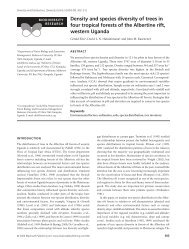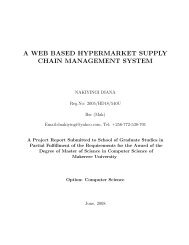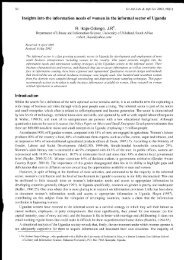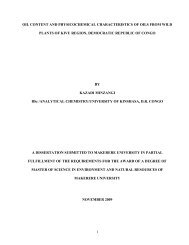THE UNIVERSITY OF LEIPZIG
THE UNIVERSITY OF LEIPZIG
THE UNIVERSITY OF LEIPZIG
Create successful ePaper yourself
Turn your PDF publications into a flip-book with our unique Google optimized e-Paper software.
generally. Historical institutionalism deals with institutional making and political change as a<br />
discrete process, characterized by extended time periods of considerable stability, interrupted<br />
by turbulent, “formative moments.” 225 During those formative periods institutions are assigned<br />
new objectives. New priorities are established and new political and administrative coalitions<br />
evolve to sustain those new policies. 226<br />
There are three important features that characterize historical institutionalism in the<br />
contemporary political science. Historical institutionalism addresses big substantive questions<br />
that are inherently of interest to the study of institutions. As already mentioned, the scholars in<br />
this area of institutionalism are also interested in tracing transformations of varying scales.<br />
Such scholars work best by delineating the origins and development of institutional structures<br />
and processes over time. They tend to emphasize sequences in the development and timing of<br />
events and phases of political change. 227<br />
This branch of institutionalism seems not to be too interested in understanding the critical<br />
roles of major actors and agents shaping structures and moments but rather in the major<br />
factors framing the moments. To them, unlike the rational institutionalists, there are no<br />
individual actors as such, whose actions and interests spurn off events. 228 They base their<br />
argument on the unintended consequences and the unpredictability of intervening events. This<br />
is well collaborated by Thelen who noted that, rationality in the strict rational choice sense is<br />
present only in so far as the intended consequences of actors are foreseen/predicted. 229<br />
In line with the above, fellow historical institutionalist Hall defines institutions as formal<br />
rules, compliance procedures and standard operating practices between individuals in the<br />
various units of the economy, puts across one strong point of distinction. He notes that the<br />
fundamental difference between the historical institutionalists and the rational choice<br />
institutionalists is on the questions of how institutions shape political behavior and where<br />
institutions come from. 230 This point of distinction therefore, places historical institutionalists<br />
at the center of societal institutions, not only looking at the individual for continuity of the<br />
societal values, but looking at social relations that shape the continuity of an entire society or<br />
polity for that matter.<br />
Historical institutionalists therefore analyze macro contexts and hypothesize about combined<br />
effects of institutions and processes. Rather than just examining only one institution, they<br />
examine the entire process over time. 231 Hence taken altogether, these three features-<br />
225 Thelen, K. 1999. Historical Institutionalism in Comparative Politics. Annual Review of PoliticalScience 2:<br />
369–404.<br />
226<br />
Jones, B.D. 2001. Politics and the Architecture of Choice. Chicago: University of Chicago Press.<br />
227<br />
Zysman, J. 1994. How institutions create Historically Rooted Trajectories. Industrial and Corporate Change<br />
31: 243-383.<br />
228<br />
Grafstein, R. 1992. Institutional Realism. New Haven: Yale University Press.<br />
229<br />
Thelen; K. 1998. Historical Institutionalism in comparative Politics. A paper presented at the APSA,Boston,<br />
Sept 3-6.<br />
230 Hall, P. 1986. Governing the Economy: The Politics of State Intervention in Britain and France: New York:<br />
Oxford University Press.<br />
231 Campbell, J. L. 2001. Institutional Analysis and the Role of Ideas in Political Economy. In Neoliberalism and<br />
47






